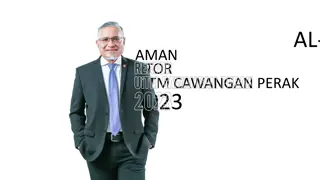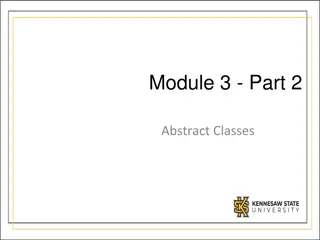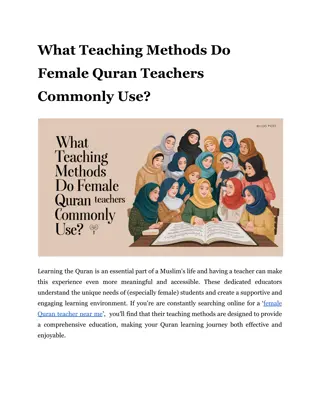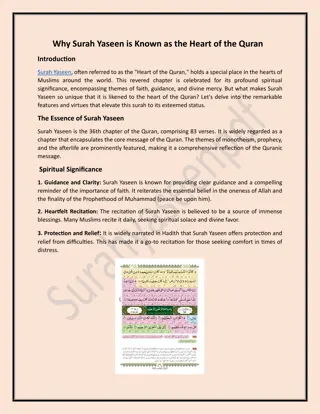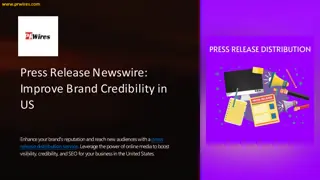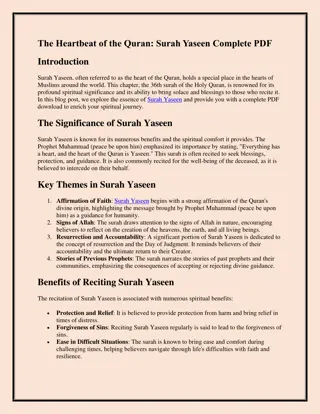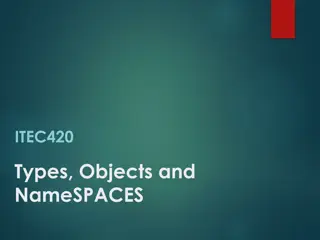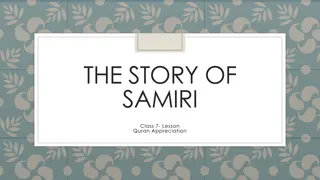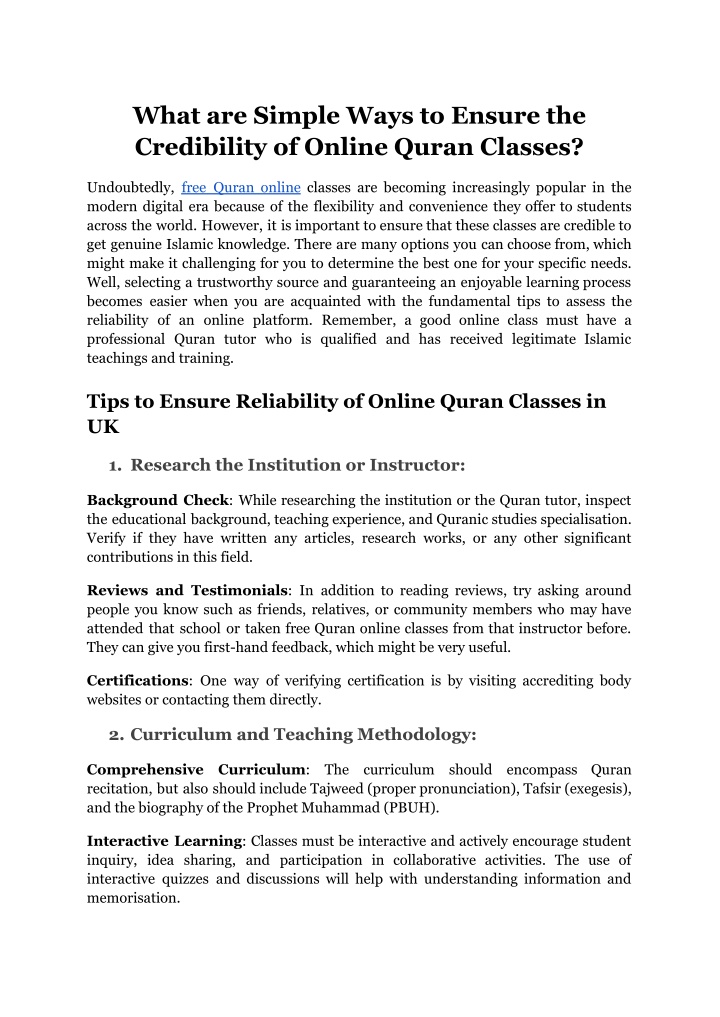
What are Simple Ways to Ensure the Credibility of Online Quran Classes
Undoubtedly, free Quran online classes are becoming increasingly popular in thenmodern digital era because of the flexibility and convenience they offer to studentsnacross the world. However, it is important to ensure that these classes are credible tonget genuine Islamic knowledge. There are many options you can choose from, whichnmight make it challenging for you to determine the best one for your specific needs.nWell, selecting a trustworthy source and guaranteeing an enjoyable learning processnbecomes easier when you are acquainted with the fundamental tips to assess thenreliability of an
Download Presentation

Please find below an Image/Link to download the presentation.
The content on the website is provided AS IS for your information and personal use only. It may not be sold, licensed, or shared on other websites without obtaining consent from the author. If you encounter any issues during the download, it is possible that the publisher has removed the file from their server.
You are allowed to download the files provided on this website for personal or commercial use, subject to the condition that they are used lawfully. All files are the property of their respective owners.
The content on the website is provided AS IS for your information and personal use only. It may not be sold, licensed, or shared on other websites without obtaining consent from the author.
E N D
Presentation Transcript
What are Simple Ways to Ensure the Credibility of Online Quran Classes? Undoubtedly, free Quran online classes are becoming increasingly popular in the modern digital era because of the flexibility and convenience they offer to students across the world. However, it is important to ensure that these classes are credible to get genuine Islamic knowledge. There are many options you can choose from, which might make it challenging for you to determine the best one for your specific needs. Well, selecting a trustworthy source and guaranteeing an enjoyable learning process becomes easier when you are acquainted with the fundamental tips to assess the reliability of an online platform. Remember, a good online class must have a professional Quran tutor who is qualified and has received legitimate Islamic teachings and training. Tips to Ensure Reliability of Online Quran Classes in UK 1. Research the Institution or Instructor: Background Check: While researching the institution or the Quran tutor, inspect the educational background, teaching experience, and Quranic studies specialisation. Verify if they have written any articles, research works, or any other significant contributions in this field. Reviews and Testimonials: In addition to reading reviews, try asking around people you know such as friends, relatives, or community members who may have attended that school or taken free Quran online classes from that instructor before. They can give you first-hand feedback, which might be very useful. Certifications: One way of verifying certification is by visiting accrediting body websites or contacting them directly. 2. Curriculum and Teaching Methodology: Comprehensive recitation, but also should include Tajweed (proper pronunciation), Tafsir (exegesis), and the biography of the Prophet Muhammad (PBUH). Curriculum: The curriculum should encompass Quran Interactive Learning: Classes must be interactive and actively encourage student inquiry, idea sharing, and participation in collaborative activities. The use of interactive quizzes and discussions will help with understanding information and memorisation.
Quality of Materials: Authenticity, reliability, and reputability should be considered when selecting study materials. They should also cater to different ages and backgrounds while being culturally sensitive. 3. Technology and Platform: Secure Platform: To safeguard the personal information of students and guarantee secure online transactions, encryption should be used by the site. User-Friendly Interface: Good navigation is important, as well as tools that can be easily accessed. There should be extra features that enhance learning such as interactive whiteboards or breakout rooms, which allow for group activities. Tech Support: If any technical difficulties are encountered or there is a need for guidance on how best to use the platform, customer support should be responsive all the time 24/7 through chat, email, or phone. 4. Student Support and Engagement: Personalised Attention: Smaller class sizes or individual sessions can aid in personalising attention to cater to the unique learning needs of learners, as well as giving specific responses from trainers. Feedback Mechanism: A feedback system should foster transparency and be approachable so that students are motivated to give positive criticism, which might help better the course and teaching techniques. Community Engagement: Forums or social media groups can help learners connect virtually, thereby promoting peer support and collaborative learning. 5. Transparent Pricing and Policies: Clear Pricing: The details of prices should be direct and without any concealed costs. Giving a description of the charges and specifying what each payment is for would be useful as well. Flexible Payment Options: Offering different payment schedules can enable students from varied economic backgrounds to afford the course. Another alternative may be to provide incentives in the form of discounted prices to customers who pay before the due date or refer others to purchase. Cancellation and Refund Policies: One reason that students are encouraged by the clear policies on cancellations, rescheduling, and refunds is because of their beneficial provision. This gives them peace of mind about their investment, knowing there are options if something unexpected comes up.
6. Trial Classes or Demo Sessions: Free Trials: It is always a good idea to try some sessions first before signing up for the entire course. This will enable you to evaluate if the training style is appropriate for you or if it is friendly enough. Teaching Style: Secondly, during these free trials, take note of how teachers deliver their lessons and engage with learners. Different people respond better to different kinds of instruction depending on their learning styles. Content Quality: Thirdly, the demos must be filled with meaningful information. Depth shows that the content is well-researched while accuracy ensures credibility. 7. Cultural Sensitivity and Inclusivity: Cultural Awareness: Seek institutions or instructors who have undergone training in cultural competency. Such training will equip them with the knowledge necessary to operate appropriately within diverse cultural environments. Inclusive Environment: Ensure that disabled students have access to learning materials as well as any other necessary accommodations needed for an inclusive education system. Try finding classes that involve you in community service projects. This can help foster inclusiveness amongst different communities, also providing educational opportunities through social activities. Conclusion To guarantee a true and quality Islamic education, it is significant to choose authentic online Quran classes in the UK. You should conduct comprehensive research, look through comments, and take part in trial lessons to make an informed choice. By relying on our Quran tutors at Quraan Teacher, you can start a fruitful educational journey towards understanding the Quran more deeply and addressing the challenges you face while reciting the Holy Book. FAQs How can I check if a Quran institution is certified or not? You should check if there are any certificates from well-known Islamic educational organisations on their website or contact them directly for information. Are online Quran classes in the UK effective enough? Yes, they are effective if you deal with a reputable organisation and follow the right methodology. Such classes may even prove to be more effective than traditional ones, allowing for better adaptation and individualisation of learning.
Site Article: What are Simple Ways to Ensure the Credibility of Online Quran Classes?


